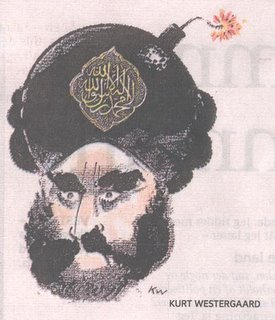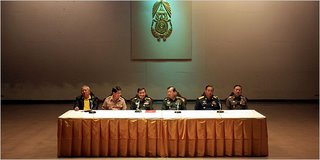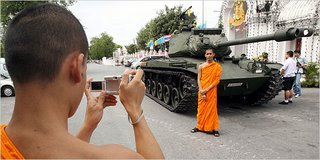
Here are
the despicably vile Danish cartoons that manage to stir the hornet's nest within the Muslim
ummah and whip some into destructive fanatical frenzy. While any acts of violence in response to this inane provocation cannot be justified, the fact remains that the publisher's "freedom-of-speech" defense is simply lame and has left much to be desired.
Freedom of speech is the bedrock principle of democracy, without which the process will be rendered meaningless. But as with any other types of freedom, a line has to be drawn to delineate of what is proper and what is not. The question that has persisted since Hobbes first wrote his philosophical treatise "The Leviathan" more than 400 years ago is how much freedom is too much; or in a communal sense, how much freedom one has to give up for the sake of collective security and stability? Unfettered freedom, according to Hobbes, will lead to his famous dictum of "a war of all against all" (
bellum omnium contra omnes). Thus, how does one balance this delicate equation of freedom and security? Who gets to enforce the rules that ensure stability and punish any would-be violaters? Hobbes was an ardent supporter of the monarchy and he used this treatise to provide a theoretical framework to prop up the dwindling legitimacy of the monarchs: his conception of the omnipotent Sovereign--"The Leviathan"--who possesses the unbridled authority to enforce the rules and maintain collective security and stability. This I'm vehemently opposed to, but it is generally agreeable that some kind of a structure has to be set up for the sole purpose of maintaining this tenuous equilibrium.
Back to the questions of how can the freedom of speech be restrained, what are its limits, and can the limits be effectively imposed so as not to possibly degenerate into abuse of power and authoritarianism? I know it is such a cliché but I believe that the most effective restraint comes from the individuals themselves. No, I'm not advocating self-censorship; only the hope that one can exercise this hard-earned freedom with great care and utmost resposibility. What is the intention of this Danish newspaper in publishing these inflammatory cartoons? It said that it was a public satire, which might or might not be true. I can definitely see satirical value in at least one of them, the one that shows a suicide bomber gets up to heaven and the angel tells him that there are no more virgins left. It pokes fun at the ridiculous incentive that supposedly awaits wannabe suicide bombers--quite a hoot, if you ask me. But, where is the razor-sharp Swiftian satire in the depiction of Prophet Muhammad (p.b.u.h) wearing a bomb turban? Now, that is just a sophomoric, and to add, moronic, act that serves nothing but to stir up cheap, sensationalistic controversy to sell more papers.
Another point of refutation is the frivolous claim made by some of the prominent Zionists, particularly
Abe Foxman at
Anti-Defamation League (ADL), that Muslims, especially in the Arab countries, don't hold themselves to the same standard they demand from other religious groups vis-à-vis the issue of freedom of speech. As the claim goes, major newspapers in Arab countries frequently run cartoon prints that caricature and ridicule the Jewish people (read: Israel) inasmuch as equating the state of Israel with the murderous Hitler's Third Reich.
One such print I've seen is an image of the Israel's Star of David superimposed on the Nazi's Swastika flag. While this might be considered a bit over-the-top but there are parallels between the two regimes that are worth looking into. For one, the current ghetto-ization of the Palestinians in West Bank is creepily similar to what happened to the Jews in Germany sixty years ago. Gaza Strip, for all intents and purposes, is the world's largest prison. While it is by no means comparable to the ghastly nature of the WWII Jewish concentration camps of Dachau, Treblinka, Auschwitz and others, it is only a short slide away down the slippery slope of semantics for history to perversely repeats itself.
Moreover, I don't see much difference between the ethno-nationalistic makeup of the present Jewish state and the Aryan-based state of the Third Reich idealized by Hitler. Both champion a nation-state that is entirely made up by, ideally, a single ethnic group; and both states are racial chauvinists, projecting superiority over others, and even more ironic, both claim to be God's "chosen people." Israel for Jews and Germany for Aryans--like fucking peas in a pod! By the way, all Jews in the Diaspora have automatic Israeli citizenship whether they want it or not. It's their so-called God-given right, a right that is obviously not bestowed on the Palestinians who were expelled from their ancestral land in 1948.
On the flip-side, the acts of violence in retaliation to these idiotic caricatures perpetrated by some quarters of the Muslim
ummah are simply morally indefensible and reprehensible. The same principle of freedom of speech applies to the protesters as well, and it behooves them to be peaceful, responsible and decorous in exercising their rights to dissent. How can one preach limits to free speech when one does not abide by it? It's eeriely ironic to see the same people who call for checks on unfettered free speech to say nothing of the wanton destruction of public and private properties from the ensuing protests. There are other non-violent avenues that people can pursue in order to register their grievances and to make their feelings known. Going down this path of senseless violence is definitely not one of them, and it is certainly playing into the hands of these
provocateurs. Islam is a peaceful religion that respects all, and it is imperative that we claim the moral high ground amidst this maelstrom of controversy. Why stoop to their level?
Anyway, one of the photos in the NY Times coverage of this hulabaloo shows a protest in Jakarta and the people in the photo are unmistakably clear: they are members of the Fron Pembela Islam (FPI), a formerly powerful and well-organized Muslim organization/militia in Indonesia comprised of mostly street thugs, urban toughs, criminals and other unsavory characters which last prominent act was to sabotage the pro-democracy movement in the aftermath of Soeharto's fall in May of 1998. To expect acts of random brutality from them is nothing new but so far I haven't heard anything more than orderly street protests in Jakarta. Good for them!
 Based from my observation, when asked, a lot of people cannot named the largest democracy in the world. They thought it's either the US (obvious choice) or Europe (as if the whole continent is a one big unified country) or stranger still, Canada (yeah, the country's big but moose outnumber people here by ten to one!). People, the answer is INDIA.
Based from my observation, when asked, a lot of people cannot named the largest democracy in the world. They thought it's either the US (obvious choice) or Europe (as if the whole continent is a one big unified country) or stranger still, Canada (yeah, the country's big but moose outnumber people here by ten to one!). People, the answer is INDIA. 












